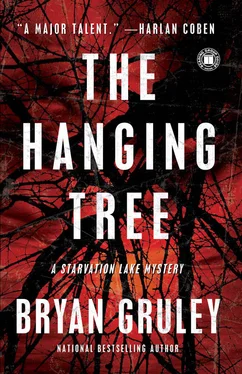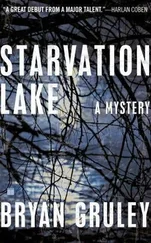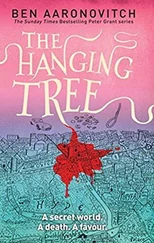Bryan Gruley - The Hanging Tree
Здесь есть возможность читать онлайн «Bryan Gruley - The Hanging Tree» весь текст электронной книги совершенно бесплатно (целиком полную версию без сокращений). В некоторых случаях можно слушать аудио, скачать через торрент в формате fb2 и присутствует краткое содержание. Жанр: Триллер, на английском языке. Описание произведения, (предисловие) а так же отзывы посетителей доступны на портале библиотеки ЛибКат.
- Название:The Hanging Tree
- Автор:
- Жанр:
- Год:неизвестен
- ISBN:нет данных
- Рейтинг книги:3 / 5. Голосов: 1
-
Избранное:Добавить в избранное
- Отзывы:
-
Ваша оценка:
- 60
- 1
- 2
- 3
- 4
- 5
The Hanging Tree: краткое содержание, описание и аннотация
Предлагаем к чтению аннотацию, описание, краткое содержание или предисловие (зависит от того, что написал сам автор книги «The Hanging Tree»). Если вы не нашли необходимую информацию о книге — напишите в комментариях, мы постараемся отыскать её.
The Hanging Tree — читать онлайн бесплатно полную книгу (весь текст) целиком
Ниже представлен текст книги, разбитый по страницам. Система сохранения места последней прочитанной страницы, позволяет с удобством читать онлайн бесплатно книгу «The Hanging Tree», без необходимости каждый раз заново искать на чём Вы остановились. Поставьте закладку, и сможете в любой момент перейти на страницу, на которой закончили чтение.
Интервал:
Закладка:
From a story I had done on car crashes, I happened to know an emergency doctor at, of all places, Grace Hospital. I wrapped Gracie in a Maple Leafs jersey I had in my trunk, laid her on my backseat, and took her to the hospital. The doctors pumped her stomach. Out came Dilaudid, Quaaludes, cocaine, some alcohol. My doctor acquaintance explained that this was a dangerous mix, especially for someone who had been driving. He asked if Gracie might be willing to seek counseling. I told him I doubted it.
I slept on and off on a chair in the ER waiting room. The doctor nudged me awake around six the next morning and told me Gracie would be OK. I left thirty bucks at the reception desk for a cab. I had to get to work.
For the next two weeks, I called Gracie almost every day, trying to get her to see me, foolishly, vainly thinking that I could talk her into getting some help. She didn’t return my messages, unless you count the registered letter a lawyer sent on her behalf to the publisher of the Detroit Times.
The one-page letter said I had made “persistent and inappropriate advances” on one Grace McBride. It said that if I did not cease and desist immediately, “further action” would be taken, including a court order barring me from any future contact with my second cousin.
The publisher gave the letter to my boss at the time, a guy named Virgil Ropolletti. Rope sat me down in his glassed-in office in the newsroom, put his unlaced Hush Puppies up on his desk, and lit a Camel. He’d won a Pulitzer as a young man for stories on a state lawmaker who had created a secret stash of taxpayer cash he doled out to buddies. He was on his fourth wife-all from circulation or ad sales-and was now obsessed with finding the body of Jimmy Hoffa.
“Well, sweetie,” he said, “what do I do with this?”
I told him what had happened at the Red Devil. Rope knew the place, knew the owner, the barmaids, everybody. He could check it out if he wanted. But he wouldn’t bother. He knew me, too.
“This chick hot?” he said.
“Jesus, Rope. She’s my cousin.”
“Sorry.”
“Frankly, I don’t know how the hell she can afford a lawyer.”
“Hot-shit firm, too,” he said. He dropped his half-smoked cigarette in a Coke can. “Sounds like my second wife. Families are all fucking crazy, if you ask me.”
I thought of Mom, decided there was no need to tell her any of this.
“Yep.”
“So what are you going to do?”
“What she wants me to do. Nothing.”
“The old man,” he said, pointing up at the fifth floor where the publisher’s office was, “he’s a little worked up over this. He’s worried it’s going to show up in the Free Press.”
“Nope,” I said, knowing I’d be calling Michele Higgins as soon as I left Rope. “Won’t happen.”
“OK. But why don’t you make yourself scarce, take a couple days off?”
I didn’t see Gracie again until she moved back to Starvation Lake-except, if it really was her, at that Red Wings playoff game, sauntering down to the rinkside seats with the dapper man in the turtleneck.
fifteen
Dirty white splotches of rock salt pocked the gray boulevards of Melvindale. I waited at a red light at the intersection of Greenfield and Schaefer. Not a single car passed in front of me. I supposed many locals would have been working the day shift at the Ford plant just across the Rouge River in Dearborn.
The light changed. I steered my truck slowly along the wide streets, six and eight lanes across. Streets that were almost empty of cars and trucks. Melvindale apparently had expected more, believing the auto industry would keep it growing forever. I’d root for it anyway. I liked the towns downriver from Detroit-Romulus, Trenton, Allen Park, Lincoln Park, Ecorse, Wyandotte, Melvindale. I’d played a lot of late-night hockey at the rinks there while employed at the Times, drunk more than a few early morning beers at the redbrick bars, scarfed and invariably regretted scarfing sliders from the White Castle at Dix and Oakwood.
I’d played there as a kid too, tending goal for the River Rats. I loved the Yack Arena in Wyandotte, with its polished oak beams arching gracefully over the ice surface; we’d beaten Mic-Mac there to win a Christmas tournament when I was sixteen. In Ecorse, we were down by a goal late in a game against a local team when a dad standing in the mezzanine over our bench dumped a Coke on us and earned his team a two-minute penalty; Soupy scored the tying goal on a low slap shot from the left face-off dot and, in overtime, slipped a backhander between the befuddled goalie’s legs for one of our sweetest wins ever.
Then there was the rink in Trenton, home of the Pipefitters, a cramped, frozen box with a corrugated tin roof and bleachers along one side of the ice that swayed under the weight of more than a thousand people, almost every one in ’Fitters black and gold. One game, we had a 4–1 lead after two periods and came out in the third determined to grab our first win ever against what most people believed, year after year, was the best team in Michigan. When the Pipefitters tied it up with three goals in four minutes and thirty-six seconds, I looked out through my goalie mask and swore that the roof was trembling with the crowd’s ferocious din. With fourteen seconds to go, Zilchy had a chance to break a 5–5 tie. His hurried wrist shot beat the ’Fitter goalie over his left shoulder but hit the crossbar and sailed harmlessly over the glass.
After the game, Zilch sat on the floor against the dressing room wall, his head in his hands. Nobody noticed him sobbing at first, but then he began to weep, louder every second, and then to scream, shaking, hysterical, tears streaming down his cheeks, tearing his helmet off and slamming it against the floor until it split in two. “Fuck, Zilch,” Soupy said. He jumped up and crossed the room, one skate on and one off, and slapped Zilchy once, hard, across the face. Just like we’d seen on TV. And just like that, Zilchy stopped.
We never did beat the Pipefitters.
I turned onto Allen Road. I wasn’t going anywhere in particular, not yet. I had no idea where Gracie had lived. But Mich had given me rough directions to Vend’s address. Now I was working up the courage to go there. As a reporter, I had never grown comfortable with confronting people face-to-face, no matter how many times I did it. I did not envy the cop reporters who routinely had to show up on people’s doorsteps to ask what they felt about their teenage daughter being found raped and knifed to death in a viaduct along the Lodge Freeway. I wasn’t sure I wanted to present myself on the porch of a man who took joy in breaking another man’s nose with his head, who I was beginning to believe had a hand in the death of Gracie McBride.
I passed a radiator shop, a two-story condominium complex trimmed with shake shingles, a Moose lodge, three gas stations, an awning shop, a motel with Christmas lights strung around its windows. There was an Italian bakery, a bar, a bank branch, two liquor stores, a pharmacy, a McDonald’s, a Chinese restaurant called Ming Sun, a Slavic one called Putka’s. I slowed my truck as I passed Wally’s Wonder Print, trying to see in through the windows.
Bare maples and oaks and ragged piles of mud-crusted snow lined both sides of Harman Street. The sidewalks were clean. Neat bungalows nestled behind the matted brown lawns, patchy with snow. Basketball hoops with their nets removed stood outside one- and two-car garages. I passed the house twice, once going south, once north. I circled around Hanna Street to Elizabeth and back up Harman again. I parked across the street and two doors down from Vend’s house, beneath an enormous oak that could have doubled as the tree in which Gracie was found.
Читать дальшеИнтервал:
Закладка:
Похожие книги на «The Hanging Tree»
Представляем Вашему вниманию похожие книги на «The Hanging Tree» списком для выбора. Мы отобрали схожую по названию и смыслу литературу в надежде предоставить читателям больше вариантов отыскать новые, интересные, ещё непрочитанные произведения.
Обсуждение, отзывы о книге «The Hanging Tree» и просто собственные мнения читателей. Оставьте ваши комментарии, напишите, что Вы думаете о произведении, его смысле или главных героях. Укажите что конкретно понравилось, а что нет, и почему Вы так считаете.












